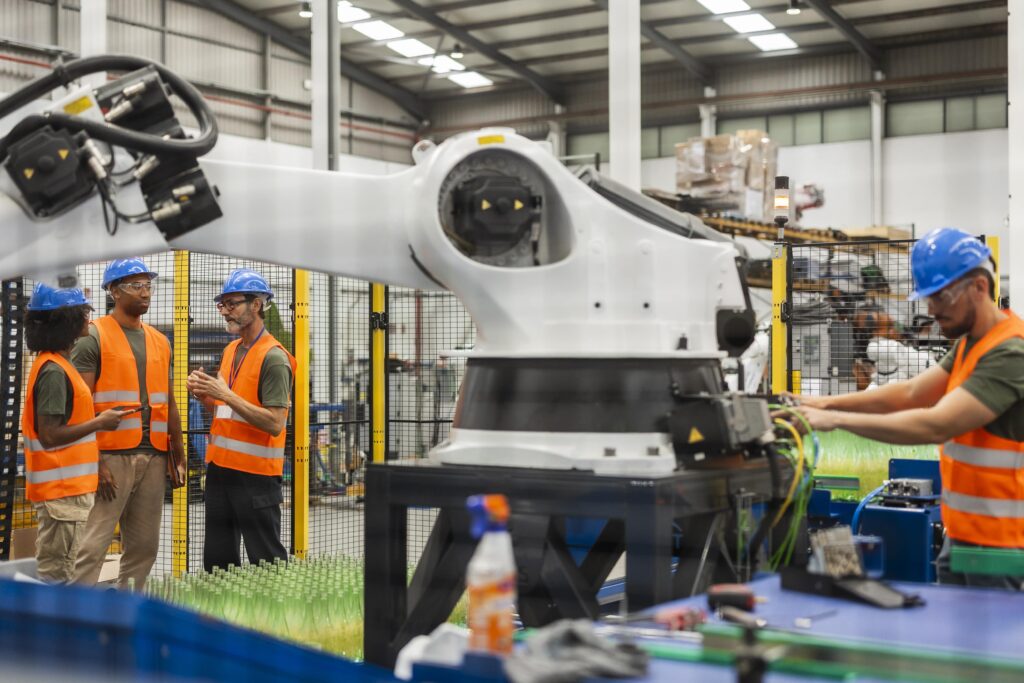In fast-paced (and often challenging) manufacturing environments, achieving operational efficiency and maintaining high product quality are paramount.
Manufacturers are constantly seeking ways to optimise production processes. , and one of the solutions that has emerged as a game-changer for driving shop floor efficiency is the Manufacturing Execution System (MES System).
But, what exactly are MES systems, and how can they benefit your manufacturing operations?
These systems are not just about managing production lines. They are about transforming how manufacturers approach every aspect of their operations, from supply chain management to customer satisfaction.
This comprehensive guide will provide you with a thorough understanding of MES systems, their functionalities, and how they integrate with ERP systems to streamline production processes.
By delving into the intricacies of MES, we aim to equip you with the knowledge to make informed decisions about adopting and implementing these systems to enhance your manufacturing efficiency and productivity.
What is an MES System?
A Manufacturing Execution System (MES) is a software-based solution designed to monitor, control, and optimise manufacturing operations in real-time.
By providing a comprehensive view of the entire production process, MES systems enable manufacturers to make informed decisions that enhance productivity and product quality.
MES systems act as a bridge between the production floor and the enterprise resource planning (ERP) systems, creating a seamless flow of information that facilitates better management and coordination of manufacturing activities.
Key Functions of MES Systems
MES systems perform several critical functions that contribute to manufacturing efficiency:
- Production Monitoring: MES systems track the progress of production orders through various stages, ensuring that each step is completed on time and according to specifications. This real-time monitoring allows managers to quickly identify and resolve issues, minimising disruptions and maintaining a steady workflow. Furthermore, by tracking production in real-time, MES systems help in assessing the performance of different shifts and workstations, providing insights into areas that require improvements or adjustments.
- Quality Management: By monitoring production parameters and collecting data, MES systems help identify and address quality issues before they escalate. This proactive approach to quality management ensures that defects are detected early, reducing the likelihood of costly recalls or rework. Additionally, MES systems support compliance with industry standards and regulations by documenting quality checks and audits, thereby safeguarding both the manufacturer’s reputation and customer trust.
- Inventory Control: MES systems manage raw materials, work-in-progress, and finished goods inventory, minimizing waste and reducing storage costs. Effective inventory control ensures that materials are available when needed without overstocking, which can tie up capital and lead to obsolescence. By integrating with supply chain management systems, MES can also enhance forecasting and demand planning, helping manufacturers respond swiftly to market changes.
- Performance Analysis: By analysing real-time data, MES systems provide insights into equipment performance, helping identify bottlenecks and areas for improvement. This data-driven approach enables manufacturers to implement preventive maintenance, reducing downtime and extending the lifespan of equipment. Furthermore, performance analysis can highlight training needs for personnel, ensuring that the workforce is equipped to maintain optimal production levels.
Benefits of Implementing MES Systems
Implementing an MES system offers several advantages that can significantly improve manufacturing operations:
- Enhanced Production Efficiency: By providing real-time data and insights, MES systems enable manufacturers to optimize production processes, reduce downtime, and improve overall efficiency. With streamlined operations, businesses can increase throughput and meet customer demands more reliably, thus enhancing market competitiveness. Furthermore, the efficiency gains from MES implementation can lead to a more agile production environment, capable of quickly adapting to new product introductions or changes in production schedules.
- Improved Product Quality: Continuous monitoring and quality control ensure that defects are detected early, leading to higher product quality and customer satisfaction. High-quality products not only strengthen brand loyalty but also reduce costs associated with warranties and returns. Additionally, an MES system can facilitate collaboration between production and quality assurance teams, fostering a culture of continuous improvement and innovation.
- Cost Reduction: With better inventory management and reduced waste, MES systems contribute to significant cost savings. Never has it been more important to manage those costs within a manufacturing operation with increasing material costs and, most recently, increases in National Insurance contributions. The ability to track and optimise resource usage helps in reducing energy consumption and minimising raw material wastage, contributing to environmental sustainability as well as cost efficiency. Moreover, MES systems can reduce labour costs by automating routine tasks and enabling more effective workforce management.
- Informed Decision-Making: Access to real-time data allows for more informed decision-making, helping manufacturers respond quickly to changing market demands. This agility is crucial in today’s dynamic market environment, where the ability to pivot quickly can be a significant competitive advantage. Real-time data also enables strategic planning by providing insights into long-term trends and potential areas for innovation and expansion.
Integration with ERP Systems
MES systems and ERP (Enterprise Resource Planning) systems are complementary tools that, when integrated, provide a holistic view of manufacturing operations.
While MES systems focus on the execution of manufacturing processes, ERP systems manage business processes, such as finance, procurement, and human resources. The integration of these systems ensures that information flows seamlessly across the organisation, enhancing coordination and operational efficiency.

It is worth noting that DELMIAWorks ERP has a fully embedded MES System within it. It is not simply integrated, it is at the very core of the application.
If you’re running a different ERP System however, you can still take advantage of DELMIAWorks MES System.
Benefits of MES-ERP Integration
- Seamless Data Flow: Integration ensures that data flows seamlessly between the shop floor and the management level, providing a unified view of operations. This seamless data flow eliminates silos and fosters collaboration between different departments, leading to more cohesive and strategic decision-making. Moreover, it enhances data accuracy and integrity, reducing the risk of errors that can arise from manual data entry or disparate systems.
- Enhanced Planning and Scheduling: By combining production data from MES with business data from ERP, manufacturers can improve production planning and scheduling, leading to better resource utilisation. This integration allows for more precise demand forecasting and capacity planning, ensuring that resources are allocated efficiently and effectively. Additionally, enhanced planning capabilities can lead to improved customer service levels by ensuring timely delivery of products.
- Improved Traceability: MES-ERP integration enhances traceability, allowing manufacturers to track products from raw materials to finished goods, which is crucial for regulatory compliance and quality assurance. This traceability is vital for industries with stringent regulatory requirements, such as pharmaceuticals and food and beverage, where product recalls must be managed quickly and efficiently. Moreover, enhanced traceability can improve supply chain transparency, fostering stronger relationships with suppliers and customers.
- Comprehensive Reporting: Integrated systems provide comprehensive reports that combine operational and business data, offering valuable insights for strategic decision-making. These reports can support performance benchmarking, identify trends, and uncover opportunities for innovation and improvement. Furthermore, comprehensive reporting capabilities facilitate compliance reporting and audits, reducing administrative burdens and ensuring adherence to regulations.
MES Solutions: Choosing the Right Software
When selecting an MES solution, it’s important to consider the specific needs of your manufacturing operations. Here are some factors to consider:
- Scalability: Ensure the MES software can scale with your business as it grows. The system should accommodate future expansions, whether in terms of production capacity, product lines, or geographical locations, without requiring significant reconfiguration or investment.
- Flexibility: Choose a solution that can be customized to meet your specific requirements. A flexible MES system can adapt to the unique workflows and processes of your organization, providing a tailored solution that maximizes efficiency and effectiveness.
- Ease of Use: The software should be user-friendly and easy to implement, minimizing disruption to your operations. A well-designed user interface and comprehensive training resources can facilitate faster adoption and user engagement, ensuring that the system delivers its intended benefits.
- Integration Capabilities: Ensure the MES system can seamlessly integrate with your existing ERP and other enterprise systems. Robust integration capabilities are crucial for maximizing the value of your technology investments and ensuring a cohesive digital ecosystem.
The Role of DELMIAWorks MES
DELMIAWorks’ MES System is a leading solution known for its robust features and ability to enhance manufacturing performance.
It offers a comprehensive suite of tools designed to address the unique challenges faced by manufacturers. With a focus on delivering tangible benefits, DELMIAWorks’ MES has become a trusted partner for manufacturers looking to transform their operations.
- Comprehensive Monitoring: DELMIAWorks provides real-time visibility into production processes, allowing for proactive management of manufacturing operations. This transparency enables manufacturers to anticipate and mitigate potential issues before they impact production, ensuring a smooth and efficient operation.
- Quality Assurance: The system includes tools for quality management, helping to ensure that products meet the highest standards. By integrating quality checks into the production process, DELMIAWorks helps maintain consistent product quality, enhancing customer satisfaction and brand reputation.
- Inventory Management: DELMIAWorks’ MES offers advanced inventory management capabilities, reducing waste and optimizing stock levels. This feature ensures that manufacturers can maintain lean inventories without risking stockouts, balancing cost efficiency with operational readiness.
- Seamless Integration: With its ability to integrate with ERP systems, DELMIAWorks ensures a seamless flow of information across the enterprise. This integration supports end-to-end visibility and control, enabling manufacturers to coordinate activities across departments and improve overall operational performance.
Conclusion
MES systems are an essential component of modern manufacturing operations, offering significant benefits in terms of efficiency, quality, and cost savings.
By integrating MES with ERP systems, manufacturers can achieve a comprehensive view of their operations, enabling better decision-making and improved performance. The synergy between MES and ERP systems provides a foundation for digital transformation, positioning manufacturers to thrive in an increasingly competitive market.
If you’re looking to enhance your manufacturing processes, consider implementing an MES system like DELMIAWorks. With the right solution in place, you can optimise production, improve product quality, and achieve greater operational efficiency.
Investing in MES technology not only addresses current operational challenges but also prepares your organization for future growth and innovation.
In conclusion, understanding and leveraging MES systems can transform your manufacturing operations, leading to increased productivity and competitiveness in the market.
By embracing these systems, manufacturers can unlock new levels of efficiency and agility, driving success in a rapidly evolving industrial landscape.
Contact us today to learn more about how DELMIAWorks’ MES System can make your shop floor more efficient.
Read more about DELMIAWorks’ MES System




